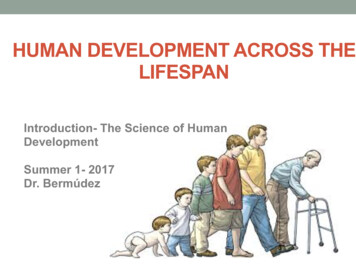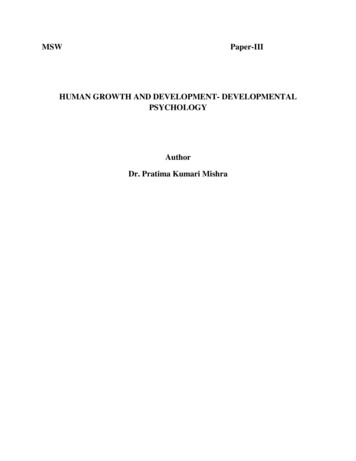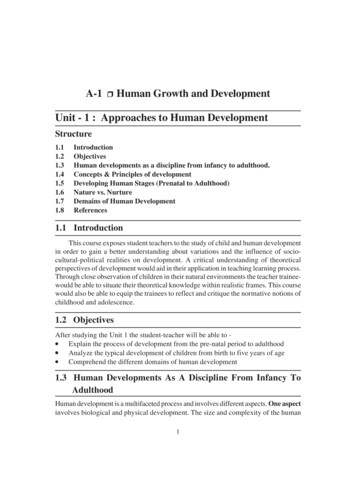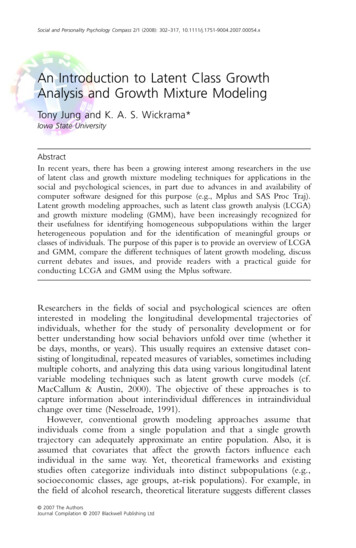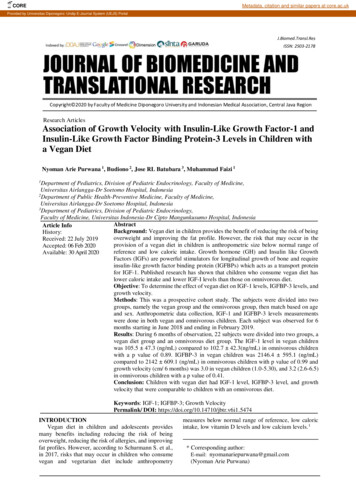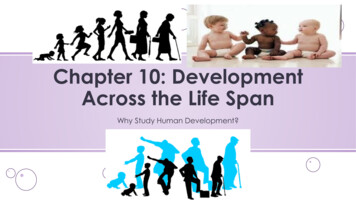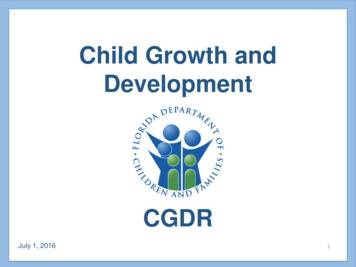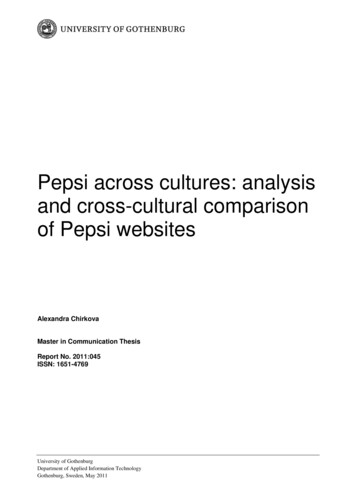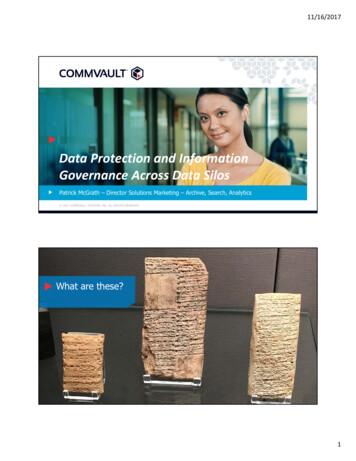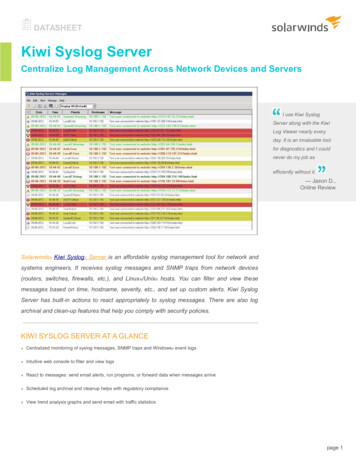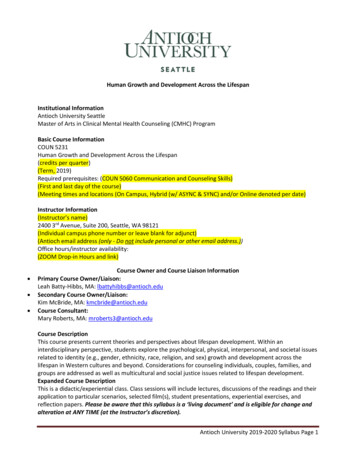
Transcription
Human Growth and Development Across the LifespanInstitutional InformationAntioch University SeattleMaster of Arts in Clinical Mental Health Counseling (CMHC) ProgramBasic Course InformationCOUN 5231Human Growth and Development Across the Lifespan(credits per quarter)(Term, 2019)Required prerequisites: (COUN 5060 Communication and Counseling Skills)(First and last day of the course)(Meeting times and locations (On Campus, Hybrid (w/ ASYNC & SYNC) and/or Online denoted per date)Instructor Information(Instructor’s name)2400 3rd Avenue, Suite 200, Seattle, WA 98121(Individual campus phone number or leave blank for adjunct)(Antioch email address (only - Do not include personal or other email address.))Office hours/instructor availability:(ZOOM Drop-in Hours and link) Course Owner and Course Liaison InformationPrimary Course Owner/Liaison:Leah Batty-Hibbs, MA: lbattyhibbs@antioch.eduSecondary Course Owner/Liaison:Kim McBride, MA: kmcbride@antioch.eduCourse Consultant:Mary Roberts, MA: mroberts3@antioch.eduCourse DescriptionThis course presents current theories and perspectives about lifespan development. Within aninterdisciplinary perspective, students explore the psychological, physical, interpersonal, and societal issuesrelated to identity (e.g., gender, ethnicity, race, religion, and sex) growth and development across thelifespan in Western cultures and beyond. Considerations for counseling individuals, couples, families, andgroups are addressed as well as multicultural and social justice issues related to lifespan development.Expanded Course DescriptionThis is a didactic/experiential class. Class sessions will include lectures, discussions of the readings and theirapplication to particular scenarios, selected film(s), student presentations, experiential exercises, andreflection papers. Please be aware that this syllabus is a ‘living document’ and is eligible for change andalteration at ANY TIME (at the Instructor’s discretion).Antioch University 2019-2020 Syllabus Page 1
Program Competencies & OutcomesBy successfully completing the requirements for this course, students will be able to understand anddemonstrate competencies in the following areas.Primary Learning Objectives (PLOs):By successfully completing the requirements for this course, participants will be able to:1. To understand ethical and culturally relevant strategies for promoting resilience and optimum developmentand wellness across the lifespan (F-3-i)2. Understand approaches for conceptualizing the interrelationships among and between work, mental wellbeing, relationships, and other life roles and factors (F-4-b)3. Have a general framework for understanding differing abilities and strategies for differentiatedinterventions (F-3-h)4. Understand systemic and environmental factors that affect human development, functioning, and behavior(F-3-f)Student Learning Objectives (SLOs):By the end of the course, students are expected to:1. To learn self-care strategies appropriate to the counselor role (F-1l)2. To explore the impact of spiritual beliefs on clients’ and counselors’ worldviews (F-2-g)3. To be able to understand and implement theories of individual and family development across the lifespan(F-3-a)4. To be able to apply theories of learning, theories of normal and abnormal personality development, andunderstand bio-psychosocial factors that affect overall development and functioning across the lifespan (F3-b, c, e)5. To understand effects of crisis, disasters, and trauma on diverse individuals across the lifespan (F-3-g)Related 2016 CACREP Standards:2.F.3. HUMAN GROWTH AND DEVELOPMENT2.F.3.a. theories of individual and family development across the lifespan2.F.3.b. theories of learning2.F.3.c. theories of normal and abnormal personality development2.F.3.e. biological, neurological, and physiological factors that affect human development,functioning, and behavior2.F.3.f. systemic and environmental factors that affect human development, functioning, andbehavior2.F.3.g. effects of crisis, disasters, and trauma on diverse individuals across the lifespanAntioch University 2019-2020 Syllabus Page 2
2.F.3.h. a general framework for understanding differing abilities and strategies for differentiatedinterventions2.F.3.i. ethical and culturally relevant strategies for promoting resilience and optimum developmentand wellness across the lifespanLearning Objectives(CACREP 2016)Key Performance Indications (KPIs)Direct (D), Indirect (I), Evidence & Assignment (A)Understand theories of individual andfamily development across the lifespan(2.F-3-a)Completed course readings; active in-class participation;small and large group experiences; integration of theoryin all reflection papers, presentations and wellnessassignment; summation and integration of theory in finalpaper.D: Course readings, active participation, homework,case studies, and narrative assessments.I: Course EvaluationsA: Developmental Reflection Paper/ JournalsHave the ability to apply theories oflearning, theories of normal andabnormal personality development, andunderstand bio-psychosocial factors thataffect overall development andfunctioning across the lifespan (2.F-3-b,c, e)Completed course readings; active in-class participation;small and large group experiences; integration of theoryin all reflection papers, presentations and wellnessassignment; summation and integration of theory in finalpaper.D: Course readings, active participation, homework,case studies, and narrative assessments.I: Course EvaluationsA: Research Project/Group Presentation/ JournalsRecognize systemic and environmentalfactors that affect human development,functioning, and behavior (2.F.3.f.)Completed course readings; active in-class participation;small and large group experiences; integration of theoryin all reflection papers, presentations and wellnessassignment; summation and integration of theory in finalpaper.D: Course readings, active participation, homework,case studies, and narrative assessments.I: Course EvaluationsA: Research Project/Group Presentation/ JournalsUnderstand effects of crisis, disasters,and trauma on diverse individuals acrossthe lifespan (2.F-3-g)Completed course readings; active in-class participation;small and large group experiences; integration of theoryin all reflection papers, presentations and wellnessassignment; summation and integration of theory in finalpaper.D: Course readings, active participation, homework,case studies, and narrative assessments.I: Course EvaluationsA: Research Project/Group Presentation & DevelopmentalAntioch University 2019-2020 Syllabus Page 3
Final Paper/ JournalsHave a general framework forunderstanding differing abilities andstrategies for differentiatedinterventions (2.F-3-h)Completed course readings; active in-class participation;small and large group experiences; integration of theoryin all reflection papers, presentations and wellnessassignment; summation and integration of theory in finalpaper.D: Course readings, active participation, homework,case studies, and narrative assessments.I: Course EvaluationsA: Research Project/Group Presentation/ JournalsReview ethical and culturally relevantstrategies for promoting resilience andoptimum development and wellnessacross the lifespan (2.F-3-i)Completed course readings; active in-class participation;small and large group experiences; integration of theoryin all reflection papers, presentations and wellnessassignment; summation and integration of theory in finalpaper.D: Course readings, active participation, homework,case studies, and narrative assessments.I: Course EvaluationsA: Wellness Journal, Developmental Final Paper, &Research Project/Group PresentationLearning ExperiencesAndragogical Design: This course is a mix of didactic and experiential learning. Students will learn vialecture, reading, discussion, demonstration and practice. Much of the class time will be involved withexperiential and self-reflective activities.Because of the experiential learning inherent in this course, the instructor uses an emergent designprocess, which means that the instructor may change the design of the course depending upon group andclass development needs. The instructor will discuss this process with student participants.Learning ResourcesTextbooks & ReadingsBook Titles & AuthorsREQUIRED: Broderick, P (2019) The life span: human development forhelping professionals, 5th ed. Boston: PearsonISBNISBN 13: 978-0-13-522776-3ISBN 10: 0-13-522776-3RECCOMMENDED: Gardiner, H. W. (2018). Lives across cultures: Crosscultural human development (6th ed.). Boston: PearsonEducation.ISBN-13: 978-0134629445ISBN-10: 0134629442FURTHER READING: Barrett, L. (2018). How emotions are made.Houghton Mifflin Harcourt. Boston: MAISBN-10: 9781328915436ISBN-13: 978-1328915436Antioch University 2019-2020 Syllabus Page 4
FURTHER READING: Hickok, G. (2014) The myth of mirror neurons: TheISBN-13: 978-0393089615real neuroscience of communication and cognition. W. W. Norton ISBN-10: 0393089614& Company: New York: NY*Other required readings (articles, chapters, etc.) will be posted on Sakai on a weekly basis.MA Programs Multicultural ReferencesLee, C. C. (Ed.). (2006). Multicultural issues in counseling: New approaches to diversity (3rd ed.). Alexandria,VA: American Counseling Association.McGoldrick, M., Giordano, J., & Garcia-Preto, N. (Eds.). (2005). Ethnicity and family therapy (3rd ed.). NewYork, NY: Guilford Press.Andragogy ReferencesKnowles, M. (1975). Self-Directed Learning. Chicago: Follet.Knowles, M. (1984). The Adult Learner: A Neglected Species (3rd Ed.). Houston: Gulf Publishing.Knowles, M. (1984). Andragogy in Action. San Francisco: Jossey-Bass.Course Requirements1. Adherence to Antioch University Seattle procedures stated in the syllabus and defined in theAntioch University Seattle s-catalog/2. Submitting ALL course assignments on time—late work is not accepted unless emergencydocumentation is provided3. Course Evaluations: Students evaluate all courses during mid-term and at the end of the quarter.The final course evaluation is required for all students in all courses.Additionally, to earn credit for this course, all students must meet minimum attendance (students shouldnot miss any classes unless emergency documentation is provided; missing more than one class will resultin a failing grade for this course), scholarship, and competence standards. These requirements are asfollows:Attendance: Students are expected to attend all scheduled classes. Credits may be denied for failure toattend more than 90% of class sessions (see above). (Antioch Seattle University Catalog). Each participant isexpected to be on time for all classes and to attend a minimum of 90% of the classes. Arrival to class morethan 15 minutes late will result in a “missed class.”Active participation in class exercises and discussions. (e.g., to engage in both small and large groupinteractions in a manner that demonstrates interpersonal effectiveness, openness to group membershipand leadership experiences, seeking out and being open to feedback, and showing respect for the entireclass as a community of learners).Complete assigned readings (see CLASS SCHEDULE below).Complete all assignments by due date (see CLASS SCHEDULE below).Written work should be typed and turned in hard copy, double-spaced, proofed, and reflect graduatecompetency in both technical and grammatical arenas; Papers should reflect APA format whereAntioch University 2019-2020 Syllabus Page 5
applicable (all citations, even in refection papers, must follow APA).Students are expected to demonstrate graduate level analytical thinking as well as self-reflection and selfcritique. Assignments are expected to be on time. Assessments that do not follow APA writing guidelineswill be considered below graduate level work and will place the student in jeopardy of not receiving creditfor the course. Instructor may ask students to re-write papers when necessary and students will likelyreceive an average of the two, posted marks.Course Assignments and ScheduleThe schedule of assignments and course content are subject to change at the discretion of the facultymember. Please be available during Week Eleven to accommodate any required changes in schedule (e.g.,in response to emergency situations).Reading: Read all assigned material before the class meeting each week.ASSIGNMENTS1. Wellness Assignment:You will write a wellness plan and keep a weekly journal to monitor your wellness and self-care for the restof the quarter. Counseling not only demands the highest levels of performance, it also subjects counselorsto stresses and challenges that may threaten individuals’ coping abilities. The 2014 American CounselingAssociation Code of Ethics, in Section C.2.g, states in part, “Counselors monitor themselves for signs ofimpairment from their own physical, mental, or emotional problems and refrain from offering or providingprofessional services when impaired.” Maintaining a holistic lifestyle when working through life strugglesfor both yourself and your clientele is not only a reminder of the difficulty associated with personal change,but illustrates the importance of wellness when promoting the same for others. Understanding your ownpersonal developmental milestones and lifespan development is imperative to your success as a clinician.Take detailed notes after lectures and dyad/discussions in order to write a weekly journal reflection that isbased on your own personal wellness. Your musings will be written up (1-2 pages) and presented to theclass in varying forms on a weekly basis.This assignment has three parts:a. Wellness Plan: Write a 2-page wellness plan to reflect on your wellness and your self-care plan forthis quarter. (*Due: Week 2, and you will share briefly about your plan with the class)b. Wellness Activity: You will bring one wellness activity (10-15 minutes) to the class to help yourpeers learn about self-care and wellness. (*Due: Assigned schedule between Week ?)c. Entry: You will write a 1-2 pages wellness journal every week. The purpose of the journal is to helpyou monitor your progress of self-care and to incorporate what you have learned from the class(reading materials, class discussion, activities). Also be prepared to share your progress in thegroup’s check-in. (*Due: Week ?).2. Developmental Reflection PaperYou will write a 8-10 pages reflection paper (APA format, including title page and references). Utilize yourlearning from this class (readings, class activities, discussion) from week 1 to week 8 to write this paper.Antioch University 2019-2020 Syllabus Page 6
a. Choose a period of your own lifespan development (i.e. early childhood, middle childhood,adolescence, etc.) and address significant issues and life events that occurred within biopsychosocial and development.b. Utilizing one or a blend of developmental theories (Piaget/Vygotsky/Erikson etc.) presented in yourreading (or not mentioned), the paper will present theoretical context specifically related to thisperiod of personal development.c. Also, culture is a broad concept. Identify ONE idea, belief, OR value that you learned as anindividual that came from: the culture of your family one that came from the culture of your community or neighborhood one that came from your broader cultural or ethnic background one that came from your religious culture.*Reflection Paper Due: WEEK 8All reflection papers are due ELECTRONICALLY into your Sakai Dropbox (paper versions will NOT beaccepted).3. Group Research Project-Part 1:Participate in a small group (3/4 students) research project. Each group will select a lifespan developmentstage (early childhood, adolescence etc. and a developmental issue (e.g., Cultural development,adolescence, socio-emotional development, etc.), researching relevant developmental, social and clinicalissues. Research must identify/contextualize issue using one relevant theory on prevention and wellnessand include interventions based on those theories. No two groups will research the same issue. This will bediscussed in class, ahead of time (think about this assignment during week 1-5 and discuss in class, thengroups will be assigned by the instructor to begin research During week 5). Selections of topic will be madeon a first come, first served basis.DUE: Please notify instructor of your choice by email no later than in Week 5’s class. Instructor’s choice isfinal.4. Group Research Project-Part 2:Each group will make a 45-60-minute oral presentation to the class summarizing their research findings (seepart 1). Each member of the group will participate in a portion of the presentation. (minimum 15 minutes,maximum 20 minutes). Your presentation must address the implications of your learning for your work as acounselor, including your thoughts and feelings, what you learned about yourself and how you willintegrate this learning into your personal life and professional work. Additionally, the presentation shouldaddress the possibilities/challenges of working with this lifespan development stage/developmental issue,suggested interventions, and potential treatment outcomes, including cultural considerations.DUE: These presentations will be scheduled for the last two class sessions – Weeks ? Instructor willdecide on order of presentation during week ?.Final AssessmentAll students will receive a final assessment of their overall competency for this course based on a masterymodel of accomplishment—on student’s ability to demonstrate an increased capacity to understand andAntioch University 2019-2020 Syllabus Page 7
apply the learning material as they progress through this course. Hence, as students demonstrate thisprogression, they will receive a level of competency attainment for the course that is commensurate withthe quality of their final demonstration of learning. Refer to the Appendices and APA Writing Style Rubrics.COURSE SCHEDULE1) The schedule assignments and course content are subject to change at the discretion of the facultymember(s).2)Week/DateDueClass SessionReadings/HomeworkWeek 1DATEVideo: Watch inpreparation for week 1’sclass: BabiesDocumentary (2010-79minutes) Amazon Prime( 2.99-it is yourresponsibility to pay thisfee).Topic: Introduction to CrossCultural Human LifespanDevelopment.Readings due: NONE Week 2DATEWellness Plan’s DueTopic: The Early Years Week 3DATEJournal Log Check In’sWellness ActivityIntroductions –dyads/experientialDiscussion of s Discussion/small groupsReadings discussion:dyads/groupPowerPoint/lecture/video clipCase Study: Early ChildhoodTopic: Early Years Continued Readings discussion:dyads/groupPowerPoint/lecture/video clipCase Study: Early ChildhoodRead SyllabusSAKAI WEEK 1Readings due:Chapter 1&2 (Broderick, 2019)SAKAI WEEK 2Readings due:Chapter 3,4,5 (Broderick, 2019)Recommended Reading:Chapter 1&2 –(Gardiner, 2017)SAKAI WEEK 3Antioch University 2019-2020 Syllabus Page 8
Week 4DATEJournal Log Check In’s –Wellness ActivityTopic: Middle Childhood Readings discussion:dyads/group PowerPoint/lecture/video clip Case Study: Middle ChildhoodReadings due:Chapter 6,7&8 (Broderick, 2019)Recommended Reading:Chapter 3&4 –(Gardiner, 2017)SAKAI WEEK 4Week 5DATEJournal Log Check In’s –Wellness ActivityGroup Research ProjectFinal Topic DueMid-Quarter EvaluationsDueWeek 6DATEJournal Log Check In’s –Wellness ActivityTopic: Adolescence Readings discussion:dyads/groupPowerPoint/lecture/video clipCase Study: AdolescenceReadings due:Chapter 9&10 (Broderick, 2019)Recommended Reading:Chapter 5&6 –(Gardiner, 2017)SAKAI WEEK 5Topic: Young Adulthood Readings discussion:dyads/groupPowerPoint/lecture/video clipCase Study: Young AdulthoodReadings due:Chapter 11&12 (Broderick, 2019)Recommended Reading:Chapter 7 – (Gardiner,2017)SAKAI WEEK 6Week 7DATEJournal Log Check In’s –Wellness ActivityTopic: Middle Adulthood Week 8DATEJournal Log Check In’s –Wellness ActivityDevelopmental ReflectionPaper DueReadings discussion:dyads/groupPowerPoint/lecture/video clipCase Study: Middle AdulthoodTopic: Topic: Late AdulthoodMoving Towards End of Life Readings discussion:dyads/groupPowerPoint/lecture/video clipCase Study: Late AdulthoodReadings due:Chapter 13&14 (Broderick, 2019)Recommended Reading:Chapter 8 – (Gardiner,2017)SAKAI WEEK 7Readings due:Chapter 15 - (Broderick,2019)Recommended Reading:Antioch University 2019-2020 Syllabus Page 9
Case Study: End of LifeChapter 9 – (Gardiner,2017)SAKAI WEEK 8Week 9DATEJournal Log Check In’sWellness ActivityWeek 10DATEJournal Log Check In’sWellness ActivityEnd of QuarterEvaluations DueGroup Oral Presentations Week 1Readings due: NONESAKAI WEEK 9Group Oral Presentations Week 2Readings due: NONESAKAI WEEK 10**WEEK 11-RESERVED IN CASE OF UNFORESEEN CIRCUMSTANCESThis syllabus is subject to change in extenuating circumstances and at Instructor’s DiscretionAttendance and ParticipationThis is an experiential class with dyad/triadic processing activities that provide opportunities to interactwith and learn from your peers. Such activities are significant factors in your educational growth anddevelopment. Therefore, students are expected to attend class regularly and participate in classdiscussions, class activities, and peer practice sessions at the graduate level. Students are expected todemonstrate interpersonal effectiveness, openness to feedback, and respect for the community oflearners.Each student is expected to be on time and attend for all classes. Failure to attend less than 90% of theclass meeting time, or 27 clock hours, will result in no credit for the course unless appropriate makeupwork is completed. If a student falls below the 90% standard of attendance, it is the student'sresponsibility to arrange for appropriate makeup work with the instructor. No makeup work will bepermitted and no credit will be granted in those cases where 20% or more of the total class meetingtime has been missed.If there is a need to miss a class based on emergency, it is expected that the student will contact theinstructor before the missed class. Furthermore, as stated in Antioch University’s attendance policy,missing more than one class for any reason may result in a No Credit evaluation. It is the policy of theinstructor that students who are more than 15 minutes late will receive a loss of attendance for thatclass period.ScholarshipCompletion of written assignments should be typed, double-spaced, proof read, and reflect graduatecompetency in both technical and grammatical arenas utilizing APA format. Students should submitpapers electronically through Sakai (“Assignments”). All written papers must conform to M.A.Psychology style and writing standards of graduate level scholarship. Failure to adhere to thesestandards of scholarly writing will result in the automatic return of a paper. No students will beAntioch University 2019-2020 Syllabus Page 10
permitted more than one opportunity to re-write a paper that fails to meet M.A. Psychologyscholarship standards. No re-written final papers will be accepted beyond the end of the eleventhweek of the quarter.CompetencyAll students are expected to demonstrate Required Competency in order to receive credit for thecourse. Students will be evaluated with regard to the quality and professionalism expected ofcounseling professionals. Prompt attendance, reflective preparation, demonstration of willingness tolearn basic counseling skills, peer collaboration, receive and provide feedback, and synthetic thinkingare aspects of professional counselors and expected of students throughout the course. Evaluativefeedback will occur both in person and in written throughout the quarter.CFT/CMHC/CAT COURSE & PROFESSIONAL COMPETENCY ASSESSMENT CRITERIACOURSE COMPETENCY: In order to be granted credit for a specific course, at a minimum, all CFT,CFT/CAT, CMHC, CMHC/CAT students must demonstrate an overall “Required Competency”.CFT/CFT-CAT STUDENTS: Additionally, in order to successfully move into the internship year and tograduate, students must demonstrate overall “Intermediate Competency” in 50% of courses within eachof the nine competency domains for the CFT program. A comprehensive student review by the facultyoccurs early and various points in their progress through the curriculum. If the student falls belowcompetency in any of the courses or if the student fails to achieve intermediate competency in aminimum of 50% of courses within one or more competency domains, a Student Development Plan(SDP) will be implemented, in collaboration with their advisor, to map out specific steps towardacademic improvement.CMHC/CMHC-CAT STUDENTS: Additionally, in order to successfully move into the internship year,students must demonstrate an overall “Intermediate Competency” in at least 50% of “required” coursesto date, and in order to successfully graduate the student must demonstrate an overall “IntermediateCompetency” in at least 75% of “required” courses. A comprehensive student review by the facultyoccurs at early and midpoints in their progress through the curriculum. If the student falls belowcompetency in 50% of “required” courses as they prepare to enter internship, a Student DevelopmentPlan (SDP), will be implemented, in collaboration with their advisor, to map out specific steps towardacademic improvement.PROFESSIONAL CORE COMPETENCY: In addition to the competencies specific to each course,CFT/CMHC students are also evaluated on 5 areas of Professional Core Competencies (PCC), withsubsidiary Skill or Knowledge Domains (SKD), to be demonstrated in each course and throughout theirgraduate counseling or therapy experience with peers, faculty, clients, and colleagues. TheseProfessional Core Competencies are:PCC – Professionalism and SKD – Professional:Adheres to the ethical guidelines of AAMFT/ACA. Behaves in a professional manner towardssupervisors, instructors, peers, and clients (e.g. emotional regulation). Is respectful andappreciative to the culture of colleagues and is able to effectively collaborate with others - showsability to think abstractly, recognize multiple sides of an issue and generate creative solutions;demonstrates intellectual curiosity, flexibility, and active engagement with new knowledge.PCC - Reflective Practice and SKD – Perceptual:Demonstrates capacity to engage in self-analysis, flexibility in thinking, sitting with abstractconcepts and complexity. Exhibits ability to take responsibility for behavior, choices, and mistakes.Antioch University 2019-2020 Syllabus Page 11
PCC - Applied Critical Thinking and SKD - Conceptual/Evaluative:Able to recognize multiple sides of an issues, tolerate ambiguity, accept situations which requireflexibility in thinking and creative solutions.PCC - Diversity and Social Justice and SKD – Executive:Demonstrates awareness, knowledge, and skills of both self and other, in relation to working withindividuals, groups and communities from various cultural backgrounds and identities. Works todismantle systems of marginalization, domination, oppression, and consciously resists engaging inmicro-aggressions. Micro-aggressions for these purposes are defined as; subtle or overtcommunications lacking in cultural awareness that humiliate, offend, or invalidate aperson verbally or nonverbally, intentionally or unintentionallyPCC - Written Communication and SKD – Conceptual/Evaluative:Writes clearly, professionally and reflectively; integrates personal and academic material. Presentsideas and information in an organized format. Demonstrates Master’s level technical writing skillsand APA style. Does not engage in plagiarism of any type.Depending on the reasons for failing a course, or not meeting Course or Professional CompetencyStandards required for CFT/CMHC/CAT Assessments as outlined above, a student might berequired to re-take a class, to engage in additional learning in an area assessed at a lowercompetency level, or in some cases to take a leave of absence to address personal issues, whichunder certain circumstances might include involving themselves in their own personal counseling.Definitions of Competency Levels“Below Competency” reflects a failure to sufficiently address all of the issues specified in the guidelinesas indicated in the syllabus, which includes inadequate completion in terms of the defined criteria.Failure to meet minimum attendance, graduate-level of written work, submission of assignments, andcontribute practice lab sessions. A lack of self-awareness, cultural awareness, and harmful use ofcounseling skills and interactions with peers. Defensive attitude toward feedback.“Required Competency” indicates beginning sufficiency in meeting the criteria specified in the syllabuswith no major difficulties in terms of the defined criteria. Minimum attendance is met, all theassignments are submitted with graduate-level of written work, and participated all the in-classpractice lab sessions. Receive and provided feedback effectively, and demonstrate multiculturalawareness. Required Competency is achieved through the satisfactory completion of all courseassignments and the quality of class participation and professionalism. The expectation is that all workwill be submitted on or before the date it is due (unless there is a prior arrangement with the instructor,written work submitted beyond the due date will not be accepted). As a mastery-learning course,assignments will be returned with a P (Pass) or I (Incomplete). Prompt attendance, reflectivepreparation, peer collaboration, and synthetic thinking are aspects of professional leadership andexpected of students throughout the course. Academic dishonesty will be penalized in accordance withAUS policies.“Intermediate Competency” denotes the student has met the “Required Competency” criteria as wellas demonstrated a consistently high level of mastery and sc
class development needs. The instructor will discuss this process with student participants. Learning Resources Textbooks & Readings Book Titles & Authors ISBN REQUIRED: Broderick, P (2019) The life span: human development for helping professionals, 5. th. ed. Boston: Pearson. ISBN 13: 9
